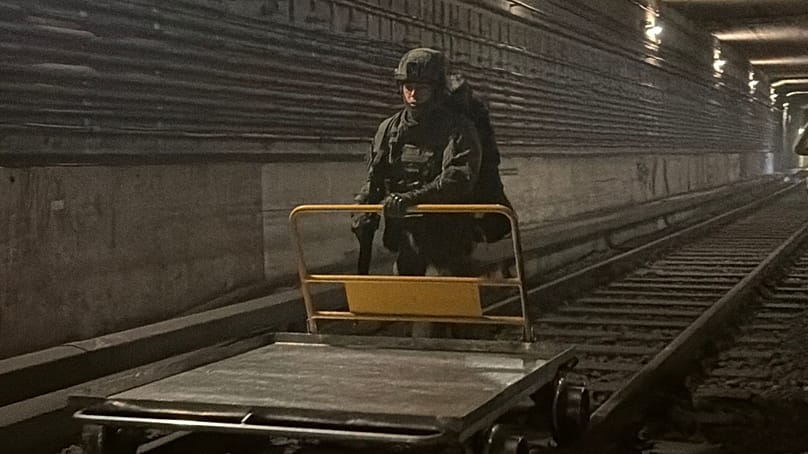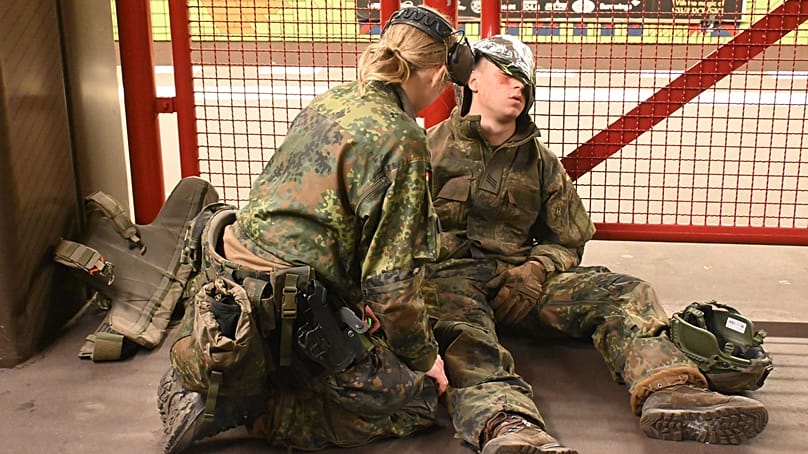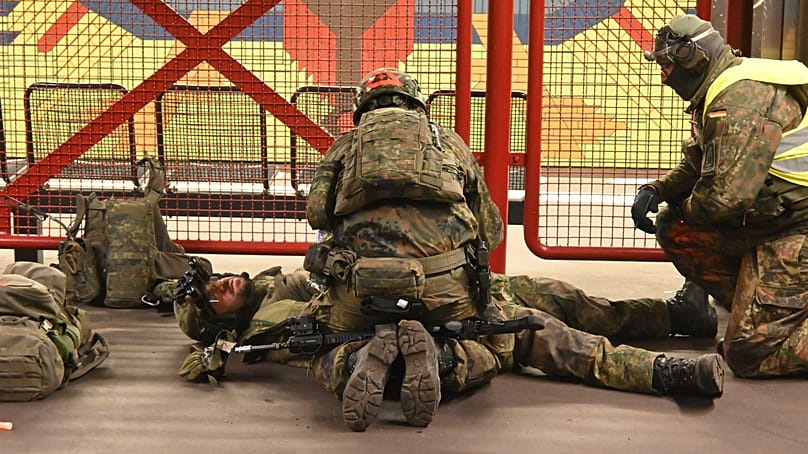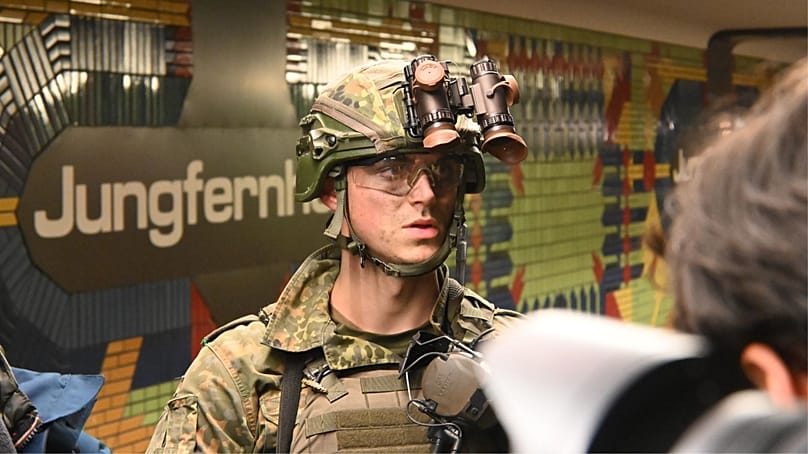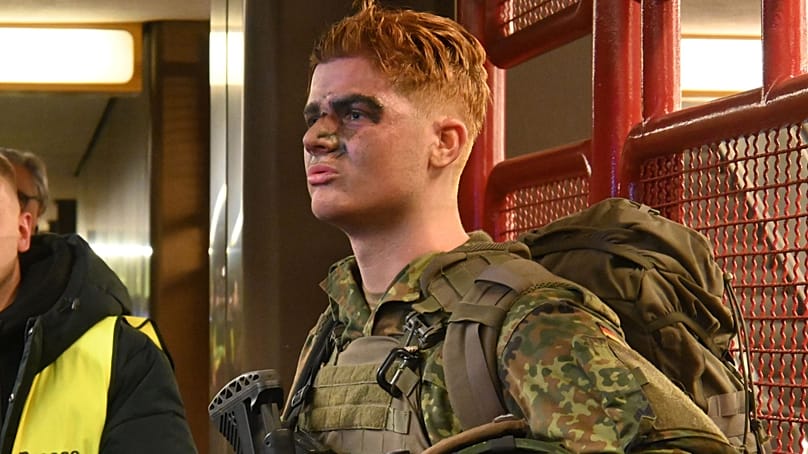The Bundeswehr is training for emergency scenarios in Berlin's streets and metro tunnels. Euronews reporter Johanna Urbancik was there on the ground to see it first-hand.
Loud screams, masked soldiers and bursts of gunfire echo through a Berlin U-Bahn station just after midnight.
The air smells of gunpowder, and a thick haze hangs over the platform. Through the smoke, a yellow metro train can barely be seen, stopped on the tracks.
For now, it's just a drill.
A group of some 30 soldiers from the Bundeswehr's Guard Battalion are practising how they would respond to an attack on the German capital.
Better known for their ceremonial duties, a platoon of the unit is training in the middle of Berlin for its actual role in a real emergency: protecting the federal government.
The drill, called "Bollwerk Bärlin III", brought together around 300 participants from 17 to 21 November to rehearse a worst-case scenario.
In the early hours of Wednesday, Euronews and other media outlets were given access to the operation.
Alongside the 30 soldiers in the platoon, actors portraying wounded civilians and additional support teams brought the total to about 50 for Wednesday's early-morning drill.
As realistic as possible
In the drill scenario, the Bundestag has declared a state of emergency, with Berlin in need of defence. The soldiers' mission is to fight "irregular forces" who have violently stopped a train carrying several of their comrades and a number of civilians.
In this scenario, the attackers are described as fictional separatists from the Havelland region of Brandenburg.
Gunfire and the screams of wounded soldiers echoed through the station as the unit sprinted across the platform toward the train. To ensure everything runs smoothly, the troops previously completed specialised training with Berlin's transport operator, the BVG.
There, they were briefed in detail on what matters in a real underground station: before the first soldier steps onto the track bed, the train operator must short-circuit the power rail. If that step is missed, the first soldier would already be "lost – without any enemy involvement.
One by one, the soldiers reached the contested BVG train, though only their silhouettes could be seen in the haze.
After a few minutes, a woman is led away by troops. It appears the separatist attackers were quickly detained – or at least some of them.
Yet the situation remained far from straightforward for those watching: screams continued to come from inside the train. "My leg", someone yelled, and another voice shouted, "Leave me behind".
By the principle of "one for all and all for one", the latter is ignored by his teammates. One after another, the wounded were retrieved and brought to safety. Some were carried along the tracks into the dark tunnel, others were lifted onto a trolley and wheeled onto the platform – and out of danger.
The injuries must be treated just as seriously during the exercise as they would be in real-world scenarios, explained Johannes, a soldier from the Second Company, after the drill.
"If someone in front of me is screaming, I want to do even better. I absolutely want to help," he said. After the train was secured and the injured soldiers evacuated, both the troops and the accompanying journalists returned to the platform.
There, we were met by the wounded role-players, lying or sitting on the ground, groaning in pain. We heard more cries of distress – but with no immediate threat, the soldiers could administer first aid. They were covered by a sniper lying on the ground nearby, rifle loaded and ready.
Is an underground attack realistic?
A frightening scene – but in this drill, no live ammunition was used, only blanks. The station was also suspended from regular service, allowing the soldiers to train without startling Berlin commuters.
But how realistic is an operation in the German capital's underground? "Very realistic," said the commander of the Guard Battalion, Maik Teichgräber.
For the unit, moving through the U-Bahn network is actually easier: it avoids street traffic and allows troops to be shifted quickly from point A to point B.
Because the Guard Battalion would operate in Berlin itself, its training has to take place directly in the city – not just on military training grounds. This way, the soldiers can familiarise themselves with the capital's complex urban layout.
"That’s why we train here, among other places – in the tunnel of Jungfernheide station – to constantly improve and ensure we're ready for deployment," Teichgräber added.
Stress, adrenaline, and team spirit
Bastian, a 20-something soldier from the Second Company, found the exercise in the metro station exhausting and stressful, yet admitted that it "was still fun" and the unit "adapted well" to the high-pressure situation.
Even in this exercise, the geopolitical security situation was not ignored. While the accompanying brochure for "Bollwerk Bärlin III" noted that, since the start of Russia's full-scale invasion of Ukraine in early 2022 and the resulting shift in the security landscape, effective national and allied defence has returned to the forefront, Russia is not explicitly defined as the enemy in the drill.
Moscow's war of aggression has, however, prompted a military buildup in Germany. German Defence Minister Boris Pistorius has called for the Bundeswehr to become "combat-ready" as quickly as possible.
For Bastian, the question of whether he is "combat-ready" is a clear yes. Yet he admitted that the Bundeswehr still needs more soldiers. He joined voluntarily but does not plan to stay in the military long-term, intending instead to transfer to the police, mainly to stay close to home.
Johannes, another young soldier in the Second Company of the Guard Battalion, also joined the Bundeswehr voluntarily. He told Euronews that his decision was driven by personal development and character-building.
"When the war of aggression against Ukraine started, it was a moment for me personally where I said, I want to do something for Germany," explained the soldier, who's also just barely over 20.
For the troops, "Bollwerk Bärlin III" continues through the end of the week. In addition to the Jungfernheide U-Bahn station, the exercise will also take place at the police training facility in Ruhleben called FightingCity, and on the grounds of the former chemical plant in Rüdersdorf.












